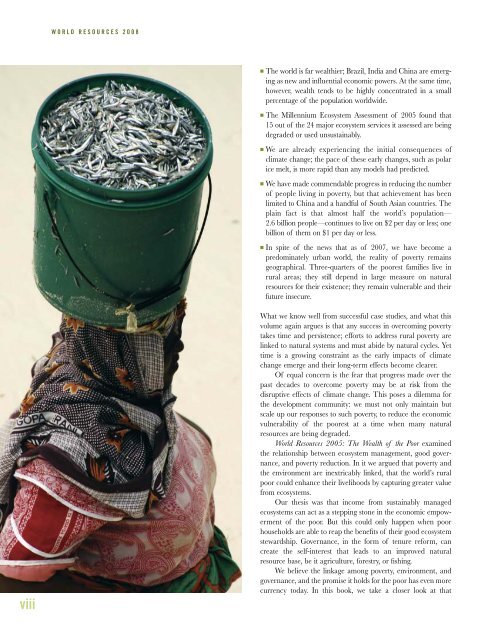Growing the Wealth of the Poor - World Resources Institute
Growing the Wealth of the Poor - World Resources Institute
Growing the Wealth of the Poor - World Resources Institute
You also want an ePaper? Increase the reach of your titles
YUMPU automatically turns print PDFs into web optimized ePapers that Google loves.
W O R L D R E S O U R C E S 2 0 0 8■ The world is far wealthier; Brazil, India and China are emergingas new and influential economic powers. At <strong>the</strong> same time,however, wealth tends to be highly concentrated in a smallpercentage <strong>of</strong> <strong>the</strong> population worldwide.■ The Millennium Ecosystem Assessment <strong>of</strong> 2005 found that15 out <strong>of</strong> <strong>the</strong> 24 major ecosystem services it assessed are beingdegraded or used unsustainably.■ We are already experiencing <strong>the</strong> initial consequences <strong>of</strong>climate change; <strong>the</strong> pace <strong>of</strong> <strong>the</strong>se early changes, such as polarice melt, is more rapid than any models had predicted.■ We have made commendable progress in reducing <strong>the</strong> number<strong>of</strong> people living in poverty, but that achievement has beenlimited to China and a handful <strong>of</strong> South Asian countries. Theplain fact is that almost half <strong>the</strong> world’s population—2.6 billion people—continues to live on $2 per day or less; onebillion <strong>of</strong> <strong>the</strong>m on $1 per day or less.■ In spite <strong>of</strong> <strong>the</strong> news that as <strong>of</strong> 2007, we have become apredominately urban world, <strong>the</strong> reality <strong>of</strong> poverty remainsgeographical. Three-quarters <strong>of</strong> <strong>the</strong> poorest families live inrural areas; <strong>the</strong>y still depend in large measure on naturalresources for <strong>the</strong>ir existence; <strong>the</strong>y remain vulnerable and <strong>the</strong>irfuture insecure.viiiWhat we know well from successful case studies, and what thisvolume again argues is that any success in overcoming povertytakes time and persistence; efforts to address rural poverty arelinked to natural systems and must abide by natural cycles. Yettime is a growing constraint as <strong>the</strong> early impacts <strong>of</strong> climatechange emerge and <strong>the</strong>ir long-term effects become clearer.Of equal concern is <strong>the</strong> fear that progress made over <strong>the</strong>past decades to overcome poverty may be at risk from <strong>the</strong>disruptive effects <strong>of</strong> climate change. This poses a dilemma for<strong>the</strong> development community: we must not only maintain butscale up our responses to such poverty, to reduce <strong>the</strong> economicvulnerability <strong>of</strong> <strong>the</strong> poorest at a time when many naturalresources are being degraded.<strong>World</strong> <strong>Resources</strong> 2005: The <strong>Wealth</strong> <strong>of</strong> <strong>the</strong> <strong>Poor</strong> examined<strong>the</strong> relationship between ecosystem management, good governance,and poverty reduction. In it we argued that poverty and<strong>the</strong> environment are inextricably linked, that <strong>the</strong> world’s ruralpoor could enhance <strong>the</strong>ir livelihoods by capturing greater valuefrom ecosystems.Our <strong>the</strong>sis was that income from sustainably managedecosystems can act as a stepping stone in <strong>the</strong> economic empowerment<strong>of</strong> <strong>the</strong> poor. But this could only happen when poorhouseholds are able to reap <strong>the</strong> benefits <strong>of</strong> <strong>the</strong>ir good ecosystemstewardship. Governance, in <strong>the</strong> form <strong>of</strong> tenure reform, cancreate <strong>the</strong> self-interest that leads to an improved naturalresource base, be it agriculture, forestry, or fishing.We believe <strong>the</strong> linkage among poverty, environment, andgovernance, and <strong>the</strong> promise it holds for <strong>the</strong> poor has even morecurrency today. In this book, we take a closer look at that
















